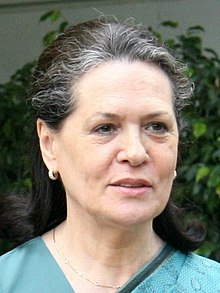Antonia Maino
|
Sonia Gandhi MP |
|
|---|---|
 |
|
| President of the Indian National Congress | |
|
In office 14 March 1998 – 16 December 2017 |
|
| Preceded by | Sitaram Kesri |
| Succeeded by | Rahul Gandhi |
| Chairperson of the National Advisory Council | |
|
In office 29 March 2010 – 25 May 2014 |
|
|
In office 4 June 2004 – 23 March 2006 |
|
| Chairperson of the United Progressive Alliance | |
|
Assumed office 16 May 2004 |
|
| Leader of the Opposition | |
|
In office 19 March 1998 – 22 May 2004 |
|
| Preceded by | Sharad Pawar |
| Succeeded by | L. K. Advani |
|
Member of the Indian Parliament for Rae Bareli |
|
|
Assumed office 17 May 2004 |
|
| Preceded by | Satish Sharma |
|
Member of the Indian Parliament for Amethi |
|
|
In office 10 October 1999 – 17 May 2004 |
|
| Preceded by | Sanjay Singh |
| Succeeded by | Rahul Gandhi |
| Personal details | |
| Born |
Sonia Maino 9 December 1946 Lusiana, Veneto, Italy |
| Citizenship | Italy (1946–1983) India (1983–present) |
| Political party | Indian National Congress |
| Spouse(s) | Rajiv Gandhi (m. 1968; d. 1991) |
| Relations | See Nehru–Gandhi family |
| Children | |
| Residence | 10 Janpath, New Delhi |
| Alma mater | Bell Educational Trust |
| Signature | |
Sonia Gandhi (![]() pronunciation ; born 9 December 1946) is an Indian politician of Italian descent. A member of the Nehru–Gandhi family, she is a former president of the Indian National Congress. Having taken over as the party leader in 1998, seven years after her husband's assassination, she remained in office for a record nineteen years, a period that was characterised by the party's renewed adherence to the centre-left position on the Indian political spectrum.
pronunciation ; born 9 December 1946) is an Indian politician of Italian descent. A member of the Nehru–Gandhi family, she is a former president of the Indian National Congress. Having taken over as the party leader in 1998, seven years after her husband's assassination, she remained in office for a record nineteen years, a period that was characterised by the party's renewed adherence to the centre-left position on the Indian political spectrum.
Born in a small village near Vicenza, Italy, Gandhi was raised in a Roman Catholic Christian family. After completing her primary education at local schools, she moved to Cambridge for higher education and married Rajiv Gandhi in 1968. She later took up Indian citizenship and began living with her mother-in-law, the then Prime Minister of India, Indira Gandhi, at the latter's New Delhi residence. Sonia Gandhi, however, continued to stay away from the public sphere, even during the years of her husband's premiership.
Following her husband's assassination, Gandhi was invited by Congress leaders to take over the government, but she refused and stayed away from politics. She finally agreed to join politics in 1997 after constant prodding from the party; the following year, she was nominated for party president, and elected over Jitendra Prasada. Under her leadership, the Congress went on form the government post the 2004 elections in coalition with other centre-left political parties. Gandhi has since been credited for being instrumental in formulating the United Progressive Alliance (UPA), which was re-elected to power in 2009. Gandhi declined the premiership following the 2004 victory; she instead led the ruling alliance and the National Advisory Council.
...
Wikipedia
